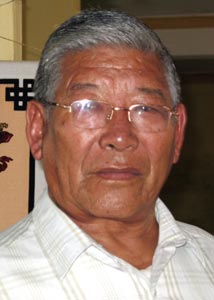Name: Wangdu
(Alias: Yes)
Gender: Male
Interview Age: 73
Date of Birth: 1934
Birthplace: Chongye, Utsang, Tibet
Year Left Tibet: 1959
Profession: Farming
Monk/Nun: No
Political Prisoner: No

Interview No.: 87
Date: 2007-07-02
Language: Tibetan
Location: Dickey Larsoe Settlement, Bylakuppe, Karnataka, India
Categories: Resistance and Revolution
Keywords: army -- Tibetan, childhood memories, Chinese army -- invasion by , Dalai Lama -- escape, escape experiences, houses/villages, March 10th Uprising, Potala Palace, resistance fighters, Utsang
Summary:
At age 17, Wangdu joined the Tibetan army as a form of tax payment for his family. The Tibetan peaceful policies were supported by the fact that the Tibetan army was more engaged in construction work than in military training and exercises. Wangdu provides a description of the unique construction methods used to build a palace in Lhasa.
Wangdu served as a Potala Palace guard from 1956 to 1959. He was an eyewitness to the shelling of the Potala Palace by the Chinese and the Tibetan uprising on March 10 and 12 of 1959. Wangdu explains how the Tibetans in Lhasa attempted to protect Norbulingka and prevent His Holiness the Dalai Lama from being captured by the Chinese.
Wangdu refused to surrender and escaped from the Potala Palace with a group of fellow guards to collect more weapons from a far away storage depot. They were unable to complete their mission because the Chinese had already taken over that area and the guards decided instead to follow the Dalai Lama's trail into exile.
Interview Team:
- Marcella Adamski (Interviewer)
- Tenzin Yangchen (Interpreter)
- Jeff Lodas (Videographer)

